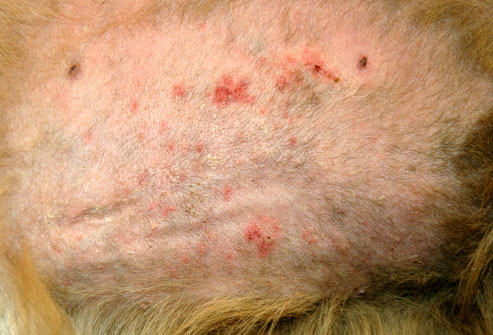Good News To Selecting Petz Park
Wiki Article
Probiotics Can Be Effective In Treating Skin Allergies In Both Cats And Dogs.
Probiotics play a significant role in preventing skin allergies and alleviating allergies in dogs. These beneficial bacteria support the health of the gut-microbiome that, consequently, aids in the immune system as well as skin. How do probiotics help reduce allergic skin conditions in dogs:
Immune System Regulation
Balanced Immune Reaction:
Function: The probiotics are responsible for controlling the immune system. They accomplish this by encouraging the growth of healthy bacteria and inhibiting the growth harmful bacteria.
Benefits: A well-balanced immune response can reduce hypersensitivity reactions that result in skin allergies. This reduces the severity and frequentity of allergic reactions.
Inflammation Reduction
Anti-inflammatory Effects:
Function: Some probiotic strains create anti-inflammatory substances and regulate the immune system's inflammatory response.
Benefits: By reducing inflammation within the body, probiotics to reduce itching and inflammation caused by skin allergies. They also help to promote healthier skin.
Gut-Skin Axis
Enhance your gut health
Function: Gut-skin axis refers back to the connection between gut health and skin. Probiotics have been proven to boost digestion health and gut barrier function.
Benefits: A healthy gastrointestinal tract will stop the leakage into bloodstreams of allergens as well as toxic substances that may trigger skin reactions. This could reduce skin allergy symptoms.
Strengthening Skin Barrier
Improved Skin Barrier Function:
Function: Probiotics have the capacity to affect the distribution and production of ceramides as with other lipids necessary for maintaining an effective skin barrier.
Benefits: A stronger skin barrier protects against environmental allergens and pathogens, reducing the incidence of skin infections and allergic reactions.
Allergy Symptom Management
The Symptom Relief
Function: Probiotics may aid in the management of symptoms by regulating the release of histamines as well as other chemical compounds involved in allergic reactions.
Benefits: This can reduce itching, redness, and discomfort that is associated with allergies to the skin, bringing relief for pets.
Improve Microbial Diversity
Increased Microbial diversity:
Function: Probiotics are important in expanding the diversity of gut microbiome. This is vital for a healthy immune response.
Benefits: By preventing an overgrowth harmful bacteria, which could cause allergies, a diverse microbiome is able to better ensure your overall well-being.
Specific Probiotic Strains
Lactobacillus (common probiotic strain) and Bifidobacterium (common probiotic strain): These common probiotics are effective in treating skin allergies among pets.
LactobacillusrhamnosusGG has been praised for its role in improving digestive health and decreasing allergies.
Bifidobacterium animalis: Helps in reducing inflammation and enhancing immune response.
Use Aspects
Dosage and administration Administration and dosage: The amount of probiotics to administer depends on the weight, size and health requirements of your pet. You should always follow your veterinarian's advice or the directions for the product.
Formulations: Probiotics for pets are available in a variety of forms, including chewables, chewables, powders and capsules. You should select a premium quality pet-specific product to ensure your pet's safety.
Monitoring and side effects. Probiotics are generally safe for pets, but it is important to monitor them to check for any reactions that are not expected. If you start with a small dose and increasing it gradually to minimize negative consequences.
Take a look at the following information for more details.
Probiotics have been proven to be effective for treating skin allergies, especially in dogs and cats. They do this by regulating their immune system, reducing inflammation, enhancing the barrier to skin and the overall health of the gut. Regular consumption of probiotics can reduce allergic symptoms for pets, help maintain healthier skin and enhance their quality of living. See the top rated natural dog probiotics advice for site info including cushings disease natural treatment, pet supplements for pets with fear of music, pet rutin supplements, pet supplements for pets with muscle weakness, canineceuticals, pet prostate supplements, pet supplements for pets with food sensitivities, pet turmeric supplements and more.

What Is The Way That Cat And Dog Kidney Failure Helped With Astragalus?
Astragalus is a plant utilized in traditional Chinese medicine - has anti-inflammatory properties, antioxidants, as well as the ability to regulate immune function. It can help treat kidney failure in dogs and cats. Astragalus assists in the following ways:
Anti-inflammatory properties
Reduction of Inflammation
Function: Astragalus contains substances like saponins, flavonoids, and polysaccharides that have anti-inflammatory effects.
Benefits: Reducing inflammation in the kidneys can slow the process of damage to kidneys and ease the symptoms associated with it while improving kidney function overall.
Antioxidant Effects
Reduce Stress from Oxidative
Astragalus: Astragalus is a potent antioxidant that has potent properties. It neutralizes free radicals, and also prevents cellular damage.
Benefits: Astragalus reduces oxidative stress and helps to protect kidney cells, which can improve kidney function as well as slowing the progression of disease.
Immunomodulation
Immune System Support:
Function: Astragalus modulates the immune system, increasing its capacity to fight off infections and reduce autoimmunity.
Benefits An endocrine system that is balanced can help reduce autoimmune responses and help prevent infections that could result in kidney disease in some animals.
Improved Kidney Function
Enhancement Glomerular Filtration (GFR).
Astragalus may increase kidney function. This is because it boosts the rate of glomerular filtering, also known as the rate that the kidneys eliminate blood.
Benefits: A better filtering system can enhance kidney function by removing excess waste and symptoms of kidney disease.
Anti-fibrotic Effects
The prevention of kidney fibers is
Astragalus is known to be anti-fibrotic, which stops the growth of scar tissues in the kidneys.
Benefits: Reducing fibrosis can help maintain functional kidney tissue vital to preserving kidney function in animals suffering from chronic kidney disease.
Support for Cardiovascular Health
Help for Cardiovascular Health
Astragalus is a potent antioxidant that improves the health of your cardiovascular system. It assists in maintaining healthy blood pressure levels as well as heart function.
Benefits: Improvement of cardiovascular health can reduce stress on the kidneys. Additionally, it enhances overall general well-being, which is particularly important for animals with kidney failure.
Diuretic Effects
Urine flow:
Astragalus is a mild diuretic that can improve urine production and aid in eliminate waste products.
Benefits: Enhanced urine flow helps to regulate fluid balance and reduce the buildup of toxins inside the body, while also supporting kidney health.
Use and Considerations
Dosage and administration: The appropriate dosage of Astragalus is determined by the size, weight and the specific health requirements of your pet. Consult your veterinarian to provide you with the right dosage and the appropriate form (e.g. capsules or tinctures).
To ensure safety and efficacy, use high-quality Astragalus supplements that are standardized. Choose products that are specifically designed for use with pets.
Astragalus generally is safe for dogs however, some pets may have stomach issues. By starting with a low dosage and gradually increasing it, you can minimize side consequences. To determine your pet's response to medication, your veterinarian should be monitoring it on a regular basis. They are able to modify the dosage when needed.
You can also read our conclusion.
Astragalus may be beneficial in the management of kidney failure for both cats and dogs. Its antiinflammatory, antioxidative as well as anti-fibrotic, immunomodulatory, and anti-inflammatory effects can help improve kidney health and function. Astragalus, under the direction of your physician is a great option to improve kidney function, and slow the progression of kidney disease, and even worsen symptoms of kidney disease. Take a look at the top rated kidney failure in cats for more recommendations including holistic pet supplements, pet supplements for pets with skin allergies, pet red clover supplements, pet supplements for show dogs and cats, pet supplements for pets with diabetes, pet red clover supplements, pet supplements for pets with fear of aging, premium quality pet supplements and more.

Apple Cider Vinegar Is Effective In Treating Yeast Infections In Cats As Well As Dogs.
ACV can be employed as a treatment for yeast infection in dogs and cats. ACV is acidic and may cause adverse reactions. While some anecdotal and scientific evidence suggests its benefits, you should take it under the supervision of a veterinarian due to its potential side-effects and its acidic nature. Here's the way ACV is believed to aid with yeast infections:
Antifungal Properties
Acidic Environment
ACV's acidity is between 2.5-3.0 pH. This acidic pH may hinder yeast growth.
Benefits Utilizing diluted ACV topically or incorporating it into your pet's bathwater may help lessen the overgrowth of yeast on the skin as well as in ears.
Skin pH Regulation
Balancing Skin pH:
ACV's purpose is to regulate skin pH. This helps maintain an endocrine-healthy barrier on the skin, and also inhibits the growth of yeast.
Benefits: Keeping a healthy pH levels on the skin can aid in preventing yeast infections, as well as improve overall skin health.
Anti-inflammatory effects
Reduce inflammation:
ACV has mild anti-inflammatory properties.
Benefits Reduce inflammation and ease symptoms like redness, itching and discomfort that can be caused by yeast infections.
Support for Digestive Health
Internal Use
ACV may promote digestive health and aid in the balance of the gut microbiome when consumed.
Benefits of a healthy gut environment: By enhancing immune function and microbial equilibrium, a healthier environment in the gut can help decrease the overgrowth of yeast.
Use and considerations
Topical Application: Apply ACV in diluted form by water (typically, 1 part ACV for 1-2 parts water) or spray or rinse on the affected areas of skin or ear. Avoid applying it to wounds that are open or on the skin.
See a veterinarian prior to considering any use for internal purposes. ACV may be administered to infants in small doses and should be extremely dilute (e.g. 1 teaspoon or tablespoon per cup of water).
Be aware of any indications of irritation that occur when applying ACV. If you experience any negative reactions, discontinue using ACV.
Consultation with Veterinarian Consultation with a veterinarian before applying ACV to treat yeast infections in pets. They will be able to provide advice on proper dilutions as well as application methods and risk factors, based upon the particular health requirements of your pet.
Click here to read the complete article
Although apple cider may provide some benefits in managing yeast infections in dogs and cats However, the use of this vinegar should be under veterinarian supervision and with cautiousness. ACV is acidic, which can create an environment that doesn't encourage yeast growth. It also has some mild anti-inflammatory properties. But, a proper dosage and careful application are crucial to avoid irritation and adverse reactions. ACV can be utilized effectively and safely when you adhere to veterinary guidance as a part of a comprehensive treatment plan to treat yeast infections in dogs. Have a look at the recommended I loved this about kidney failure in cats for site recommendations including yeast infections in dogs, pet wellbeing australia, organic pet supplements australia, pet circle, pet cbd supplements, pet supplements for pets with fear of being alone, petz park, pet brain supplements and more.
